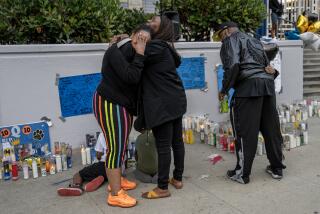The Teen-age Years: Make or Break Point : For black males, early experiences can determine destiny
- Share via
It is hard to be a young black man in America. Teen-agers, including the well-behaved and the law-abiding, find themselves constantly under suspicion. They are feared by most Americans--including other poor young black men who find each other threatening. Too often, they are written off en masse.
Junior high school, the dawning of adolescence, is a confusing time for all teens. Fitting in is important, and some boys face pressure from peers who persuasively define acceptance as shunning books, belonging to gangs or committing crimes.
As black boys enter their teen-age years, society turns up the heat. Black teen-agers go to a mall, a movie or an amusement park only to find themselves immediately under scrutiny as thieves or thugs.
Then comes high school. Forty percent of young black men in big cities do not graduate. No diploma often means no job. Today, 20% of all young black men report no income at all. That wasn’t always the case.
According to the Joint Center for Political and Economic Studies, nearly half of the black male high school dropouts of the previous generation held jobs 15 years ago. Many earned enough in auto plants, steel mills and the like to support families. Those jobs have disappeared. Gone, too, are massive federal job-training programs that made a difference.
The lack of job opportunities makes military service a common ambition in poor black communities. Young black men are twice as likely to join the military as go to college.
Black enrollment has declined sharply since 1977, when the proportion of black high school graduates matched that of white students.
Black men have taken the hardest hit, and are outnumbered by black women on most campuses.
At present, men represent about one-third of black graduates, according to an NAACP report, but that percentage was closer to 50% barely 15 years ago. the widening gap between black male and female achievement discourages middle-class marriages and leads further to the decline of the black family.
Where are the black men? An appalling number are in prison and jail. An estimated 610,000 young black men, or one out of four, are in prison, on parole or probation. That’s more than are in college.
Crack, crime and violence take a huge toll. Drugs provide an additional health menace. Heterosexual intravenous drug users account for more than one-third of the AIDS cases among black men who are dying disproportionately from that and other diseases like cancer.
Death is common in poor, black areas. Murder--primarily with guns--is the leading killer of young black men between the ages of 15 and 30. Suicide rates have also tripled during the past three decades.
Black men are the only American group to lose life expectancy during the past decade. A black man living in Harlem has less chance of reaching 65 than a poor man living in Bangladesh.
Surrounded by an affluence that seems more and more elusive, many young black men are becoming increasingly angry and alienated. The anger is usually turned inward toward themselves or other African-Americans.
Yet, in spite of very tough odds and harmful stereotypes, the majority are productive, law-abiding Americans. Those successes must be duplicated.
More to Read
Sign up for Essential California
The most important California stories and recommendations in your inbox every morning.
You may occasionally receive promotional content from the Los Angeles Times.













